
Journal of Racial and Ethnic Health Disparities
Scope & Guideline
Advancing Equity in Health Research
Introduction
Aims and Scopes
- Health Disparities Research:
The journal emphasizes empirical studies that investigate the disparities in health outcomes among racial and ethnic groups, focusing on both physical and mental health. - Cultural Competence in Healthcare:
Research exploring culturally tailored health interventions and programs aimed at improving access and quality of care for marginalized communities. - Social Determinants of Health:
Investigations into how socioeconomic status, education, employment, and community resources affect health outcomes across different racial and ethnic groups. - Structural Racism and Health:
Studies that analyze the impact of systemic racism on health disparities, including qualitative and quantitative assessments of discrimination and its health implications. - Policy and Public Health Interventions:
Research that evaluates the effectiveness of health policies and programs designed to reduce disparities and promote health equity.
Trending and Emerging
- Impact of COVID-19 on Racial and Ethnic Minorities:
A significant increase in research examining the disproportionate effects of the COVID-19 pandemic on racial and ethnic minorities, including vaccine hesitancy and access to healthcare services. - Mental Health and Racial Discrimination:
Growing attention is being paid to the mental health impacts of racial discrimination, particularly in the context of the COVID-19 pandemic and its aftermath. - Intersectionality in Health Research:
Emerging themes that explore intersectional identities (e.g., race, gender, sexual orientation) and their combined effects on health outcomes are gaining prominence. - Community-Led Health Interventions:
There is an increasing focus on studies that evaluate community-led health initiatives and participatory research approaches that empower marginalized communities. - Telehealth and Digital Health Equity:
Research on the utilization and effectiveness of telehealth services during the pandemic, particularly concerning its accessibility and implications for health equity among racial and ethnic minorities.
Declining or Waning
- Generalized Health Inequities:
There has been a noticeable decline in publications addressing broad, generalized health inequities without a specific focus on race or ethnicity, suggesting a shift towards more targeted studies. - Single-Disease Focus:
Research that solely concentrates on a single disease without considering the intersectionality of race, ethnicity, and other social determinants is less prevalent, indicating a trend towards more holistic approaches. - Historical Perspectives on Health Disparities:
There appears to be a decreased emphasis on historical analyses of health disparities, such as those rooted in colonialism or historical injustices, which may be overshadowed by contemporary issues. - Overly Broad Sociological Studies:
Studies that take a very broad sociological approach without specific racial or ethnic focus are less common, as the journal increasingly prioritizes nuanced, community-specific research.
Similar Journals

International Journal of Social Determinants of Health and Health Services
Illuminating the social factors that shape health.International Journal of Social Determinants of Health and Health Services, published by SAGE Publications Ltd, stands at the forefront of advancing research in the fields of health policy and social determinants of health. With an ISSN of 2755-1938 and an E-ISSN of 2755-1946, this journal has rapidly established itself as a key resource for academics and practitioners alike, exemplified by its impressive Q1 rankings in both Health Policy and Health (Social Science). Operating within the United States, it emphasizes open access to ensure that critical insights and findings are available to a global audience. The journal is dedicated to exploring the complex interplay between social factors and health outcomes, aiming to inform policies and practices that promote health equity. With rigorous peer-review standards and a commitment to impactful research, the International Journal of Social Determinants of Health and Health Services is a vital platform for those passionate about improving health systems and outcomes through evidence-based approaches.

Health Equity
Advancing equitable healthcare solutions for all.Health Equity is an esteemed open-access journal published by MARY ANN LIEBERT, INC, dedicated to advancing knowledge in the fields of health information management, health policy, and public health. With an E-ISSN of 2473-1242 and a commendable Q1 ranking in multiple categories for 2023, including Health Information Management and Health Policy, this journal stands at the forefront of addressing the complexities of health disparities and promoting equitable healthcare solutions. By providing a platform for original research, critical reviews, and innovative methodologies since its inception in 2017, Health Equity plays a crucial role in facilitating dialogue among scholars, practitioners, and policymakers. The journal's commitment to open access ensures that its valuable content is freely available, fostering collaboration and knowledge dissemination within the global health community. As it converges from 2017 to 2024, Health Equity continues to empower its readership to drive impactful changes in health systems and policies worldwide.

Lancet Regional Health-Americas
Fostering Collaborative Solutions for Health ImprovementLancet Regional Health-Americas is a premier open-access journal published by ELSEVIER, dedicated to advancing knowledge in the fields of health policy, internal medicine, and public health within the Americas. Established in 2021, this journal has quickly risen to prominence, achieving Q1 status in renowned categories such as Health Policy, Internal Medicine, and Public Health, Environmental and Occupational Health as of 2023. With impressive rankings, including a placement of #25 out of 310 in Health Policy and #68 out of 665 in Public Health, this journal exemplifies a commitment to impactful research and dissemination of critical health knowledge. The journal is accessible to a broad audience and promotes open scientific dialogue and exchange of innovative solutions to regional health challenges. Researchers, professionals, and students alike will find Lancet Regional Health-Americas a vital resource for the latest developments and discussions shaping the health landscape in the Americas.
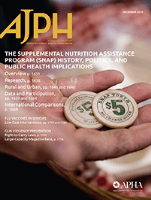
AMERICAN JOURNAL OF PUBLIC HEALTH
Advancing public health knowledge for a healthier tomorrow.The American Journal of Public Health, published by the American Public Health Association, stands as a cornerstone in the field of public health and epidemiology since its inception in 1949. With its rigorous peer-review process and a robust commitment to advancing knowledge and research practices, this journal holds a prestigious position in the academic community, as reflected in its 2023 Scopus ranking, where it is placed in the top percentile (93rd) within the categories of Public Health and Environmental and Occupational Health. The journal's focus encompasses a broad spectrum of public health topics, making it essential reading for researchers, practitioners, and students dedicated to improving population health. Subscribers can access invaluable insights through its collection of innovative studies and reviews, thereby reinforcing the journal's role in shaping public health policy and practice. By bridging research and real-world application, the American Journal of Public Health remains a vital resource for those engaged in the quest to improve health outcomes across diverse communities.
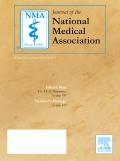
JOURNAL OF THE NATIONAL MEDICAL ASSOCIATION
Empowering Medical Discourse for Tomorrow's SolutionsThe JOURNAL OF THE NATIONAL MEDICAL ASSOCIATION, published by the NATL MED ASSOC, stands as a premier platform in the realm of medical research and discourse, with a rich history spanning from 1946 to 2024. With an impressive Q1 ranking in the field of Medicine (miscellaneous), this journal is dedicated to advancing knowledge across diverse subfields of medicine, making it a critical resource for researchers, practitioners, and students alike. Recognized for its significant impact, it holds a commendable position within the 83rd percentile of general medicine publications, ranked at #106 out of 636 by Scopus. Although currently lacking open access options, the journal continues to disseminate foundational research and innovative insights essential for driving progress in healthcare. Its commitment to quality publication reflects the high standards of the National Medical Association, ensuring that each article contributes meaningfully to the global healthcare community.
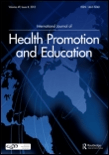
International Journal of Health Promotion and Education
Empowering Communities with Knowledge for Better HealthInternational Journal of Health Promotion and Education, a publication of Routledge Journals, Taylor & Francis Ltd, represents a cornerstone in the field of public health and health education, distinguished by its commitment to advancing knowledge and practice since its inception in 1999. With an ISSN of 1463-5240 and an E-ISSN of 2164-9545, this journal facilitates the dissemination of high-quality research dedicated to promoting health and wellbeing at various societal levels. The journal holds a Q3 status in the 2023 category quartiles for Public Health, Environmental and Occupational Health, ranking 389 out of 665 in Scopus, which underscores its relevance within the academic community. The International Journal of Health Promotion and Education publishes a range of articles—from original research to critical reviews—aimed at researchers, healthcare professionals, and policymakers, fostering interdisciplinary dialogue that is crucial for effecting positive health changes. Its rigorous peer-review process ensures only the highest caliber of research is showcased, making it an essential resource for those seeking to impact public health initiatives globally.
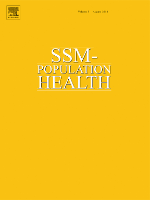
SSM-Population Health
Empowering research for a healthier tomorrow.SSM-Population Health, published by ELSEVIER SCI LTD, stands as a prestigious platform dedicated to advancing our understanding of population health dynamics. As an Open Access journal since 2015, it fosters a culture of knowledge sharing, allowing researchers, professionals, and students to access high-quality research without barriers. With exceptional rankings in the 2023 category quartiles—Q1 in Health Policy, Health (social science), and Public Health, Environmental and Occupational Health—the journal emphasizes its influential role in shaping public health discourse and policy. Its notable Scopus rankings place it in the top deciles of various health-related fields, underlining its impact on contemporary health issues and research. SSM-Population Health invites contributors to address pressing questions and solutions within the realm of population health, making it a vital resource for those aiming to make an impact in this ever-evolving field.
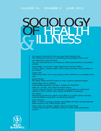
SOCIOLOGY OF HEALTH & ILLNESS
Pioneering Studies in Health Sociology Since 1979Sociology of Health & Illness is a leading academic journal published by Wiley, dedicated to exploring the intricate relationships between health, illness, and society. With an ISSN of 0141-9889 and an e-ISSN of 1467-9566, this journal has established a significant presence since its inception in 1979, continuing to provide valuable insights through to 2024. Recognized in the Q1 quartile across multiple categories, including Health Policy, Health (Social Science), and Public Health, Environmental and Occupational Health, it ranks impressively at 52nd in Social Sciences and holds a robust reputation with a Scopus classification that places it within the top percentiles of its field. The journal’s objectives focus on publishing high-quality research that advances understanding of the social determinants of health and their implications, making it indispensable for scholars, professionals, and students committed to health-related research. Operating from its headquarters in the United Kingdom, **Sociology of Health & Illness** contributes significantly to the global discourse on health and social welfare, reinforcing its vital role in shaping knowledge and policy in health and social sciences.

Journal of Migration and Health
Bridging Gaps in Health for Migrant CommunitiesJournal of Migration and Health, published by ELSEVIER, is a leading open access journal dedicated to exploring the intersection of migration and health, a critical area of study in contemporary social sciences. Since its inception in 2020, this journal has quickly established itself in the academic community, earning a prestigious Q1 ranking in several categories including Demography, Health (Social Science), Infectious Diseases, and Sociology and Political Science for 2023. With an impactful presence reflected in its Scopus Rankings—such as Rank #15 in Demography and Rank #57 in Health (social science)—the journal serves as a vital platform for researchers, practitioners, and students interested in understanding the complex health dynamics affecting migrant populations. The journal promotes scholarly discourse through rigorous peer-reviewed articles, fostering knowledge that informs health policies and practices relevant to migrants across the globe. For those keen on delving into pressing health issues influenced by migration trends, the Journal of Migration and Health offers rich insights and research opportunities, playing an essential role in shaping the future of health studies in a global context.
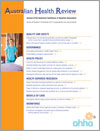
Australian Health Review
Exploring the Intersection of Research and Health PolicyAustralian Health Review is a prestigious peer-reviewed journal published by CSIRO PUBLISHING, focusing on the dynamic field of health policy. Established in 1980, this journal has continuously evolved to address contemporary health challenges in Australia and beyond, showcasing research that informs policy decisions and enhances health care delivery. With an impressive Q2 ranking in the sector of Health Policy and a Scopus rank of #162 out of 310, it holds a significant position in the academic community, offering vital insights to researchers, practitioners, and educators alike. Although not an open-access journal, it provides valuable research contributions that advance the discourse in health policy and practice. Located at UNIPARK, BUILDING 1, LEVEL 1, 195 WELLINGTON RD, LOCKED BAG 10, CLAYTON, VIC 3168, AUSTRALIA, the journal's comprehensive scope spans from 1980 to 2024, reflecting on the evolving landscape of health research. By disseminating high-quality studies, the Australian Health Review continues to play an essential role in shaping health policy and improving health outcomes.